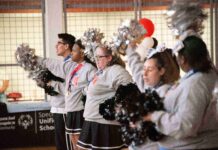They then listened as speakers reminded them that the work of the Civil Rights movement is not complete.
The program honored the legacy of the largest Civil Rights demonstration in U.S. history and the people who took part in it.
Keynote speaker Raoul Cunningham, Louisville NAACP chapter president who participated in the 1963 march as a Howard University junior, said the stated purpose of the march was to lobby for passage of President John F. Kennedy’s Civil Rights Bill.
“The unstated purpose was to reveal to the people of the United States and of the world the intensity and seriousness of the Negro demand for equality,” Cunningham said.
As he reflected on the march, Cunningham also updated the audience on some of the work needed for justice and equality today.
UofL President James Ramsey, U.S. Congressman John Yarmuth and Louisville Mayor Greg Fischer noted that people today must keep working to realize the dreams that King spoke of in 1963 and to stand up for justice and equality.
“I know that part of the commemoration was the reality of how much work there still is to be done to realize Dr. King’s dream, but I was also moved by the diverse community of people who were there on campus and how far we’ve come here at the university,” said Brian Buford, assistant provost and director of the LGBT Center. “Sharing the celebration with the mayor and congressman was really incredible to me. It told me that the university was taking a leadership role in honoring the anniversary of the march.”
Besides Cunningham, a few other people in the audience had been in Washington that day when the Civil Rights Movement galvanized. But those who weren’t could sense a little what it must have been like when O’Dell Henderson of the mayor’s office recited King’s famous speech, something he has been doing for 15 years.
The crowd stood in rapt attention as he stated those famous words, “I have a dream,” and remained so for the duration of the speech.
“After hearing Dr. King’s speech delivered with such conviction, my heart was filled with an immeasurable amount of gratitude for the many sacrifices of my parents, grandparents and the countless others that were convinced that envisioned dreams can develop into a lived-out reality for their descendants,” said Kenyatta Martin, a program coordinator in the president’s office.
Others had a different reaction.
“I felt some sadness, but hopeful,” said Vickie Bridgeman, director of REACH academic development. “We still have a lot of work to do.”
Wednesday’s commemoration is just the beginning. In closing the event, Provost Shirley Willihnganz announced that UofL is launching a five-year series of special programs called Project Progress to look back and reflect on significant events in each year from 1964 through 1968, “those years that were so moving and tumultuous for our country.”



























